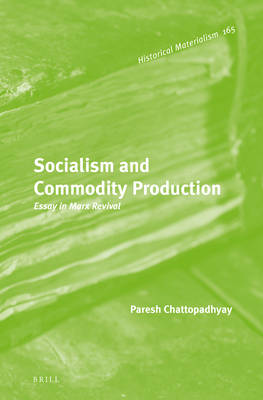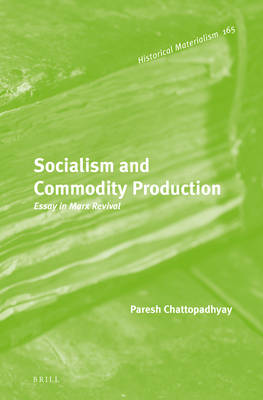
- Afhalen na 1 uur in een winkel met voorraad
- Gratis thuislevering in België vanaf € 30
- Ruim aanbod met 7 miljoen producten
- Afhalen na 1 uur in een winkel met voorraad
- Gratis thuislevering in België vanaf € 30
- Ruim aanbod met 7 miljoen producten
Zoeken
Socialism and Commodity Production: Essay in Marx Revival
Paresh Chattopadhyay
€ 238,45
+ 476 punten
Omschrijving
'Socialism' is a word that is now habitually taken to refer to a particular social system that prevailed in different parts of the globe during the twentieth century. This system was defined primarily by single-party rule with public (mainly state) ownership of the means of production along with a centrally planned economy. Its material base was generalised commodity production. The spokespersons of this system claim that this socialism was derived from Marx.
Paresh Chattopadhyay's Socialism and Commodity Production argues the falsity of this claim. On the basis of a comprehensive study of Marx's own texts, as well as a detailed engagement with a wide variety of theorists of socialist economics, it shows that Marx's socialism constituted an 'Association' of free individuals in which private ownership, the commodity, wage labour and the state have no place.
Paresh Chattopadhyay's Socialism and Commodity Production argues the falsity of this claim. On the basis of a comprehensive study of Marx's own texts, as well as a detailed engagement with a wide variety of theorists of socialist economics, it shows that Marx's socialism constituted an 'Association' of free individuals in which private ownership, the commodity, wage labour and the state have no place.
Specificaties
Betrokkenen
- Auteur(s):
- Uitgeverij:
Inhoud
- Aantal bladzijden:
- 316
- Taal:
- Engels
- Reeks:
- Reeksnummer:
- nr. 165
Eigenschappen
- Productcode (EAN):
- 9789004231641
- Verschijningsdatum:
- 16/08/2018
- Uitvoering:
- Hardcover
- Formaat:
- Genaaid
- Afmetingen:
- 160 mm x 236 mm
- Gewicht:
- 566 g

Alleen bij Standaard Boekhandel
+ 476 punten op je klantenkaart van Standaard Boekhandel
Beoordelingen
We publiceren alleen reviews die voldoen aan de voorwaarden voor reviews. Bekijk onze voorwaarden voor reviews.








